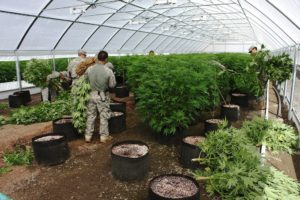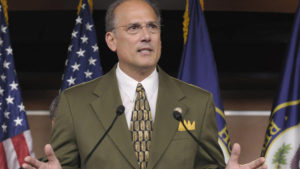Lawmakers Blame W. Va. Opioid Fiasco on Drug Distributors
Legislators from both parties point the finger at distributors who missed signs of suspicious activity that resulted in millions of prescription pills being shipped to West Virginia, a state ravaged by opioid deaths.WASHINGTON—Lawmakers of both parties accused wholesale pharmaceutical distributors on Tuesday of missing signs of suspicious activity that resulted in hundreds of millions of prescription opioid pills being shipped to West Virginia, a state disproportionately ravaged by deaths caused by the addictive drugs.
The legislators made their remarks as current and former officials from five distributor companies gave sworn testimony to a House subcommittee. The responses by drug executives ranged from apologies to explanations to finger-pointing at the federal Drug Enforcement Administration for not doing enough in its role as overseer of sales of legally controlled substances.
Asked directly whether their firm’s actions contributed to the country’s opioids epidemic, four of them answered “no” while just one — Joseph Mastandrea, chairman of the board of Miami-Luken Inc., said “yes.”
George Barrett, executive board chairman of Cardinal Health Inc., apologized to “the people of West Virginia” for huge sales to two small drug stores in the state and said, “Today I am confident we would reach different conclusions about those two pharmacies.”
The hearing came during an election-year push by Congress to pass legislation aimed at curbing a growing epidemic that saw nearly 64,000 people die last year from drug overdoses, with two-thirds of those deaths involving opioids.
The House Energy and Commerce Committee began investigating the distribution of prescription opioids last May. The panel has said distributors sent more than 780 million pills of hydrocodone and oxycodone — prescription pain-killers that have caused many overdose deaths — to West Virginia from 2007 to 2012. That’s an average of more than 400 pills per person over that period in the state, where around 1.8 million people live.
Investigators said 20.8 million opioid pills were shipped from 2006 to 2016 to Williamson, population 2,900. One pharmacy in Kermit, with around 400 residents, ranked 22nd in the U.S. in the number of hydrocodone pills it received in 2006, according to the investigation.”
Rep. Gregg Harper, R-Miss., who chairs the committee’s investigations panel, said he wanted to know “why did the distributors repeatedly fail to report suspicious orders” of prescription opioids. He added that in some cases in West Virginia, “the volume of controlled substances a distributor sends on its own should be cause for concern.”
“I mean, come on,” Rep. Diana DeGette of Colorado, the subcommittee’s top Democrat, said of the huge number of sales in that state. She said the distributors’ systems for averting suspicious sales had not worked.
Steven H. Collis, chairman of AmerisourceBergen Corp., said his company reports required information to the Drug Enforcement Administration and added “but in order to conquer this problem, it is imperative that the DEA come to the table and work with all stakeholders in the supply chain in a more cooperative and collaborative manner.”
West Virginia had the nation’s highest drug overdose death rate of 52 per 100,000 in 2016, according to federal figures. Other states with high death rates included Ohio, Pennsylvania and New Hampshire, as well as Washington, D.C.
Nearly 12 million people misused opioids in 2016, according to federal figures.
The government requires distributors of controlled substances to report suspicious drug orders to the federal Drug Enforcement Administration and to deny questionable transactions.
The Trump administration and lawmakers of both parties have been drawing attention to opioids, a range of pain-killing drugs that can be addictive when misused. They include prescription drugs like hydrocodone, oxycodone and codeine, synthetic opioids like fentanyl that can be made illegally, and illegal drugs like heroin.
The Energy and Commerce panel has been working on dozens of bills that include encouraging doctors to use non-addictive pain killers, spurring research on such products, broadening access to treatment and giving financial incentives for drug treatment specialists to work in underserved areas. Senate committees are working on their own legislation.
The setting was reminiscent of 1994 hearings at which executives of the nation’s tobacco companies testified before the Energy and Commerce panel, then controlled by Democrats. The officials said they didn’t believe cigarettes were addictive, despite evidence to the contrary.
Four years later, the industry reached a settlement to pay the states more than $200 billion over 25 years to reimburse them for tobacco-related health care costs.
Your support matters…Independent journalism is under threat and overshadowed by heavily funded mainstream media.
You can help level the playing field. Become a member.
Your tax-deductible contribution keeps us digging beneath the headlines to give you thought-provoking, investigative reporting and analysis that unearths what's really happening- without compromise.
Give today to support our courageous, independent journalists.





You need to be a supporter to comment.
There are currently no responses to this article.
Be the first to respond.